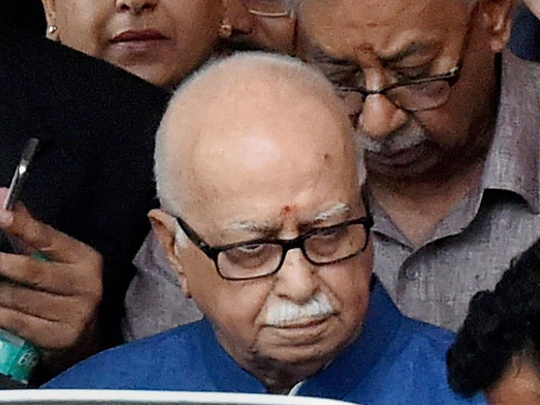
It is not surprising that stalwarts from India’s ruling Bharatiya Janata Party (BJP) have been charged with criminal conspiracy in a Central Bureau of Investigation (CBI) court for their role in demolishing the Babri Masjid (mosque) on December 6, 1992.
It has taken a quarter of a century for the law to catch up with the heroes/villains of the Ramjanmabhoomi (birthplace of Ram) movement, depending on whether one belongs to the saffron brotherhood or is with the minorities and Left-Liberals.
There is little doubt that the political fallout of the judgement on their culpability for the destruction of a 16th century protected monument will influence the outcome of the next general election in India. While the BJP will hope that a renewed focus on the temple issue, which brought it from the margins of politics to centre stage, will ensure a consolidation of the Hindu vote, there is also the possibility that the exposure of the BJP’s communal face during the trial will undermine its sabka saath, sabka vikas (with all, development for all) claim.
Although the BJP has been trying to live down its anti-minority image under Prime Minister Narendra Modi, it is no secret that the Muslims have not been fully reassured in view of the murderous activities of the gau rakshaks (cow protectors) or the love jihad campaigners who oppose inter-faith romances.
The reiteration, during the cross-examination, of some of the slogans that marked the Ramjanmabhoomi agitation revived memories of the frightening days of the 1990s. These will not only be a reminder of the essentially communal foundation of the BJP’s growth, but also of the fact that it was laid by celebrated figures in the party’s Hall of Fame who will now be standing in the dock. They include L.K. Advani, a former deputy prime minister, and Murli Manohar Joshi, a former union human resource development minister. The list includes one minister of the present Union Cabinet, Uma Bharti, who is now supposedly concerned with cleansing the river Ganges. But her main claim to fame is the time when she was the stormy petrel of the movement directed against what Advani called the “ocular provocation” of the Babri Masjid. Sadhvi Rithambara, whose venomous anti-Muslim speeches played a significant role in the mobilisation of the crowd that destroyed the mosque, has also been charged.
But the person whose rhetoric and rath yatra (chariot ride) played the most crucial part in the destruction, which India’s Supreme Court has called a “crime”, is undoubtedly Advani — currently a BJP visionary who has apparently been entrusted with the responsibility to show the party the right path.
It is doubtful, however, if he saw what lay ahead when he embarked on his futile Somnath-to-Ayodhya journey in 1990 because he didn’t reach his destination since Laloo Prasad Yadav’s government in Bihar arrested him in Samastipur. Nor could he have visualised the possibility of ending up in jail because the judiciary is unlikely to accept the Hindutva camp’s claim that the destruction was an “emphatic assertion” of Hindu pride, as the Vishwa Hindu Parishad has said.
Revisiting 1992 may not make any major difference to the existing polarisation between the communal-minded Hindus on one side and the minorities and Left-Liberals on the other. But the BJP’s worry will be the impact on Dalits (people from lower castes) who have been at the receiving end of saffron ire in recent months as during the confrontation between them and the Rajputs in Saharanpur, Uttar Pradesh, and earlier in Una, Gujarat, where several Dalits were lynched for skinning a cow — their traditional occupation.
Although the Dalit-upper caste stand-offs are common, what is new is the emergence of a new generation of Dalits like lawyers Chandrashekhar Azad “Ravana” and Jignesh Mevani who have been breathing new life into their community’s assertiveness. There is little doubt that they will make effective use of any embarrassment that the BJP may suffer in the event of the arraignment of Advani and Co. If so, the BJP’s hope of winning over large sections of the community as in 2014 and in Uttar Pradesh recently is unlikely to work. Cynics have said that ensnaring Advani and others in the 25-year-old case will enable Modi to oust from political contention those who had opposed his elevation before 2014. This view is substantiated in the latter’s opinion by Modi’s own exoneration from the 2002 Gujarat riots and BJP president Amit Shah’s from the Ishrat Jahan encounter case.
The events of 1992 and 2002 are the two black marks on the BJP’s rise to political prominence. While former prime minister Atal Bihari Vajpayee believed that the 2002 riots led to the BJP’s defeat in 2004, it remains to be seen what effect the judicial indictment of Advani and his fellow “conspirators” in the “crime” that they had committed in 1992 will have on the next general election.
— IANS
Amulya Ganguli is a political analyst.








